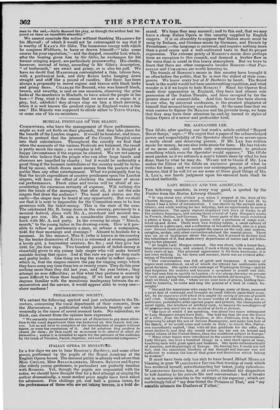ITALIAN OPERA IN MINIATURE.
IN a few days we are to hear Rossim's Barbiere, and some other pieces, performed by the pupils of the Royal Academy at the English Opera-house. The musical public is already well aware that Miss CHILDE, MISS BELLCHAMBERS, Messrs. SEGUIN and SAPIO (the elderly young gentlemen, in particular) are perfectly familiar with ROSSINI. Yet, though the pupils are acquainted with the notes, we should have thought that for a first attempt at singing the author dramatically, a more modest price might have been asked for admission. Five shillings pit, and half a guinea boxes, for the performance of those who are yet taking lessons, is a bold de- mand. We hope they may succeed ; and to this end, that we may have a cheap Italian Opera in this country supplied by English singers. It is an absurdity to suppose that Italian music must be sung by Italians, and German music by Germans, and French by Frenchmen ;—the language is universal, and requires nothing more than a good organ and a well-cultivated taste to find its proper expression. The extreme gaiety of ROSSINI'S music does perhaps form an exception to this remark, and demand a livelier flow in the veins than is usual in this heavy atmosphere. But we have to learn that there are other composers besides ROSSINI —that PAP. SIELLO and CIMAROSA are worth listening to.
The friends of RossiNi's music in this country have brought it so often before the public, that he is now the stalest of stale com- posers. We know every bar of Il Barbiere by heart. The finest work in the world would not bear uninterniitting repetition, and what wonder is it if we begin to hate ROSSINI ? Since his Operas first made their appearance in England, they have had almost sole possession of the Italian Theatre, and have occupied by far the greater share of concert-bills. And this favour has been shown to one who, by universal confession, is the greatest plagiarist of himself that musical history can furnish. At the same time that we wish success to Signor De BEGNIS and his juvenile troop, we hope that they may have their attention by-and-by turned to styles of Italian Opera of a newer and profounder kind.


















 Previous page
Previous page